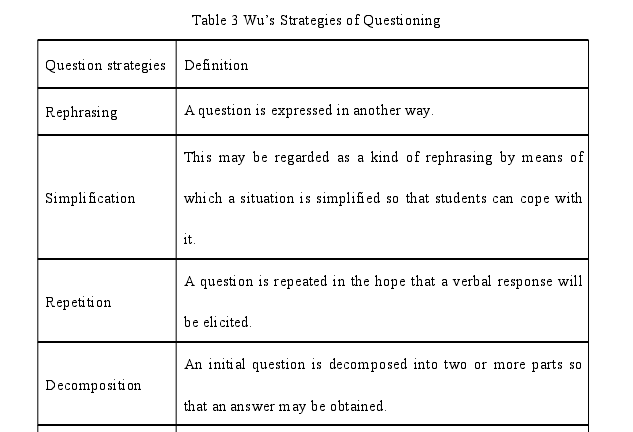联系方式
more本类最新英语论文
- 2024-04-28语块化教学对初中英语写作素..
- 2024-04-11洛阳方言擦音对初中生英语擦..
- 2024-04-06主题和语义聚类呈现对初中生..
- 2024-04-05基于英语学习活动观的初中英..
- 2024-02-25基于学习活动观的初中英语词..
- 2024-01-21初中生英语课堂环境感知调查..
- 2024-01-16基于模因论初中英语词汇教学..
- 2024-01-07通过隐喻能力培养消解初中生..
- 2023-12-25批判性阅读教学对初中生英语..
- 2023-12-17基于深度学习的初中英语阅读..
more热门文章
- 2010-02-03the application of body l..
- 2010-02-03the stimulus to students’..
- 2010-02-27the role of the english t..
- 2010-02-03交际教学法在中学英语中的应..
- 2010-02-03初中英语课堂互动教学的具体..
- 2010-02-03分析情境教学法在中学英语教..
- 2010-02-03非语言交际在中学英语教学中..
- 2010-02-04探讨英语教学中提高跨文化交..
- 2010-03-11on interest-arousing stra..
- 2010-02-26how to improve english le..
more留学论文写作指导
- 2024-03-31卡森•麦卡勒斯小说中..
- 2024-03-28美国黑人女性心理创伤思考—..
- 2024-03-27乔治·艾略特《织工马南》中..
- 2024-03-21超越凝视:论《看不见的人》..
- 2024-03-19《哈克贝利•费恩历险..
- 2024-03-13心灵救赎之旅——从凯利的三..
- 2024-02-22文学地理学视角下的《印度之..
- 2023-05-03英、汉名词短语之形容词修饰..
- 2023-02-07目的论视域下5g—the futur..
- 2022-07-04二语英语和三语日语学习者的..
初中英语教师课堂提问对批判性思维培养的观察探讨 ——优质课和常态课对比分析 [2]
论文作者:留学生论文论文属性:硕士毕业论文 thesis登出时间:2021-10-07编辑:vicky点击率:2879
论文字数:62555论文编号:org202110050939318065语种:英语 English地区:中国价格:$ 66
关键词:初中英语教学论文
摘要:本文是一篇初中英语教学论文,在本论文中,我们发现在通过提问培养批判性思维能力方面,示范课和常规课确实存在着很大的差异和一定的相似性。一般来说,模范教师比普通教师更注重提问的培养。就问题类型的相似性而言,两种课程中较低层次的问题都远远多于较高层次的问题。

Table 3 Wu’s Strategies of Questioning
...........................
Chapter Two Literature Review
2.1 Critical Thinking
Critical thinking has been a hot issue for a long time, and it has been the core ofeducation in America since 1980s. And scholars from China have been exploringcritical thinking since 21 century. Up to now, plenty of researchers from westerncountries and China have made their own contributions to it from differentperspectives.
2.1.1 Definition of Critical Thinking
If we would like to cultivate critical thinking, the first thing that needs doing isto figure out what it is. However considering the research field and perspective, thereisn’t a unified definition. Many researchers have given their own definition.
Critical thinking, as a kind of thinking skill (Wu 2004), can be tracked back toDewey’s “reflective thought”, which stands for active, persistent, and carefulconsideration of any belief or supposed form of knowledge in the light of thegrounds that support it, and the further conclusions to which it tends (Dewey 1933).Glaser (1941) has proposed that the ability to think critically involves three things:attitude, knowledge and skill. According to Glaser (1941), critical thinking calls for a persistent effort to examine any belief or supposed form of knowledge in the light ofthe evidence that supports it and the further conclusions to which it tends. ThenEnnis (1985), the pioneer of American Critical Thinking Movement, has defined it asa reasonable and reflective thinking focused on deciding what to believe or do.Lipman (1988) believes that critical thinking is a skillful, responsible thinking thatfacilitates good judgment because it (a) relies upon criteria, (b) is self-correcting, and(c) is sensitive to context. Then Paul (1987), the internationally recognized authorityof critical thinking, has distinguished it into weak sense critical thinking and strongsense critical thinking. In addition, in 1990, The Delphi Report, compiled by a panelof CT experts, has proposed that critical thinking is to be purposeful, self-regulatoryjudgment which results in interpretation, analysis, evaluation, and inference, as wellas explanation of various considerations upon which that judgment is based. InChina, Liu (1996) has brought his definition that CT is to make personal judgmenton the nature, value, accuracy and authenticity of what we see. And Luo (2000) hasposed that CT is a kind of personality quality that whether individuals are able tomake self-judgment on the process of generating knowledge, theory, method,background, evidence and criteria of evaluating knowledge. Wen (2008) hasadmitted CT as a systematic analysis and evaluation of one's own thinking for thepurpose of improving one's own thinking ability.
............................
2.2 Teacher Questioning
Questioning, in a broad sense, refers to the sentence or teaching content withthe form or functions of giving questions. A本论文由英语论文网提供整理,提供论文代写,英语论文代写,代写论文,代写英语论文,代写留学生论文,代写英文论文,留学生论文代写相关核心关键词搜索。

 英国
英国 澳大利亚
澳大利亚 美国
美国 加拿大
加拿大 新西兰
新西兰 新加坡
新加坡 香港
香港 日本
日本 韩国
韩国 法国
法国 德国
德国 爱尔兰
爱尔兰 瑞士
瑞士 荷兰
荷兰 俄罗斯
俄罗斯 西班牙
西班牙 马来西亚
马来西亚 南非
南非






